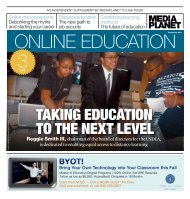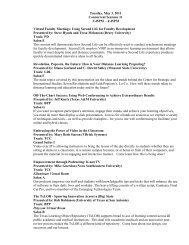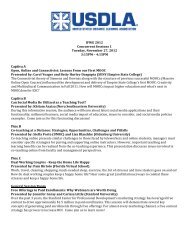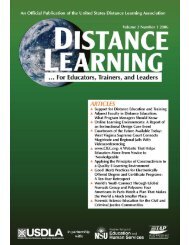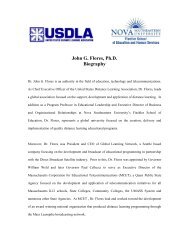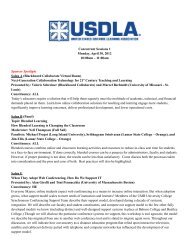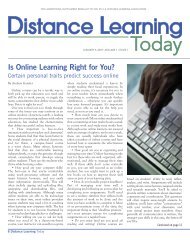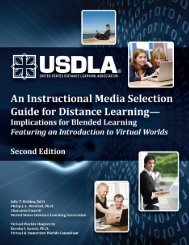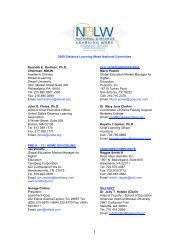United States Distance Learning Association
United States Distance Learning Association
United States Distance Learning Association
- No tags were found...
Create successful ePaper yourself
Turn your PDF publications into a flip-book with our unique Google optimized e-Paper software.
sound effects as needed. Classroom technology<br />
support can include reservation,<br />
setup, and configuration of a number of<br />
items. Relevant technologies may include<br />
projectors, laptops, and video/DVD players<br />
among other items. Classroom Support<br />
services include assisting instructors with<br />
the operation of classroom technology,<br />
installing, maintaining, and supporting<br />
classroom technology, and circulating<br />
audio/visual and portable multimedia<br />
equipment. The Office of Academic Technology’s<br />
satellite downlink services provide<br />
facilities to receive programming<br />
broadcast via satellite, with several options<br />
for delivery. Satellite downlinks can be<br />
received and redistributed on any of the<br />
Video and collaboration services systems.<br />
Each antenna is capable of receiving multiple<br />
programs from a satellite at one time,<br />
providing flexible access to programming<br />
distributed over satellite for UF campus<br />
users. This service is most often used for<br />
<strong>Distance</strong> <strong>Learning</strong> and Video-Teleconferencing.<br />
All downlinks can be made available<br />
as streaming video in addition to<br />
being broadcast on the UF cable TV network<br />
(University of Florida Office of Academic<br />
Technology, 2006).<br />
An advisory structure, consisting of the<br />
Information Technology Advisory Council<br />
(ITAC), provides recommendations and<br />
advisement to university administration<br />
regarding matters of technology on campus.<br />
Subcommittees have been established<br />
to bring the information technology leaders<br />
on campus together to participate in<br />
visioning, planning, and problem solving<br />
in relation to technology. The Academic<br />
Technology unit provides analysis and recommended<br />
direction in support of the efficient<br />
implementation of academic<br />
technology resources and functions campus-wide<br />
(University of Florida Office of<br />
Information Technology Information Technology<br />
Advisory Committee, 2007). These<br />
information technology resources are<br />
intended for university-related purposes,<br />
including direct and indirect support of<br />
the university’s instruction, research and<br />
service missions, university administrative<br />
functions, student and campus life activities,<br />
and the free exchange of ideas within<br />
the university community and among the<br />
university community and the wider local,<br />
national, and world communities (University<br />
of Florida Office of Information Technology,<br />
2006).<br />
FINANCIAL RESOURCES FOR THE<br />
INSTITUTE OF FOOD AND<br />
AGRICULTURAL SCIENCES<br />
IFAS’ $273 million operating budget consists<br />
of the funding sources displayed in<br />
Figure 2 (Institute of Food and Agricultural<br />
Sciences, 2007b). A designated portion of<br />
funding is distributed to IFAS IT for analysis,<br />
support and design purposes inclusive<br />
of, but not limited to: high-end domains,<br />
multipurpose, e-mail, backup and security<br />
servers and other equipment to create,<br />
replenish, and upgrade wide area networks<br />
(WAN) connected to various local<br />
area networks (LAN) and the virtual private<br />
network (VPN) located throughout<br />
the state of Florida and abroad.<br />
GRADUATE PROGRAMS OFFERED AT<br />
A DISTANCE BY THE COLLEGE OF<br />
AGRICULTURAL AND LIFE SCIENCES<br />
The College of Agricultural and Life Sciences<br />
offers three graduate degrees, three<br />
certificate programs, and more than 80<br />
courses through distance education. The<br />
master of science distance-delivered programs<br />
are specifically designed to meet the<br />
needs of practicing county extension<br />
agents and middle/high school agriscience<br />
teachers. The course schedule and content<br />
are tailored to best meet the instructional<br />
and scheduling needs of practicing educators.<br />
The College of Agricultural and Life<br />
Sciences administers the degree programs<br />
of the University of Florida’s Institute of<br />
Food and Agricultural Sciences.<br />
66 <strong>Distance</strong> <strong>Learning</strong> Volume 4, Issue 4



